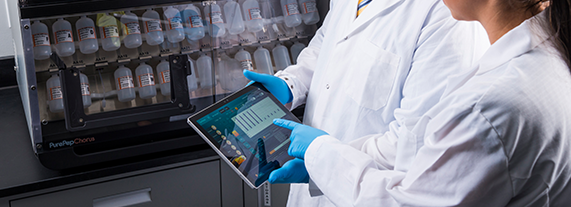
Optimizing synthesis of SARS-CoV-2 peptides for epitope analysis
How can optimizing synthesis of SARS-CoV-2 peptides for epitope analysis be made easier?
The COVID-19 pandemic caused by the novel coronavirus SARS-CoV-2 has triggered intense activity around the world and may well represent a paradigm shift in fighting infectious disease.
Peptide synthesis is one valuable component of the toolbox needed to quickly investigate the mechanism of infection, and peptides may also prove to have therapeutic properties or form the basis of a vaccine. Bioinformatics has been used to search for targets of immune responses to SARS-CoV-2, as described in a recent publication from Grifoni and colleagues[1].
The search and discovery of potential therapeutic peptides and epitopes for vaccine design puts a number of demands on the peptide sequence:
- The need for rapid synthesis of multiple sequences in parallel to provide material in large-scale screening
- The ability to optimize the synthesis of problematic sequences using flexible synthetic routes
- The need to address regulatory challenges with validated methods and software designed for regulated environments (GMP manufacture, 21 CFR Part 11)
Parallel peptide synthesis with and without heat can be the answer to making optimization easier. Read more about the peptide synthesis approaches used in a real-world example, based on the work of Grifoni and colleagues, of synthetic challenges brought by a diverse range of peptide sequences.
Fill in the form to download the White Paper
[1] A Sequence Homology and Bioinformatic Approach Can Predict Candidate Targets for Immune Responses to SARS-CoV-2. Grifoni, A. et al. Cell Host & Microbe 27, 671–680 April 8, 2020
https://doi.org/10.1016/j.chom.2020.03.002